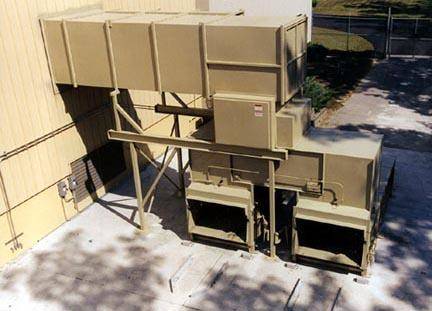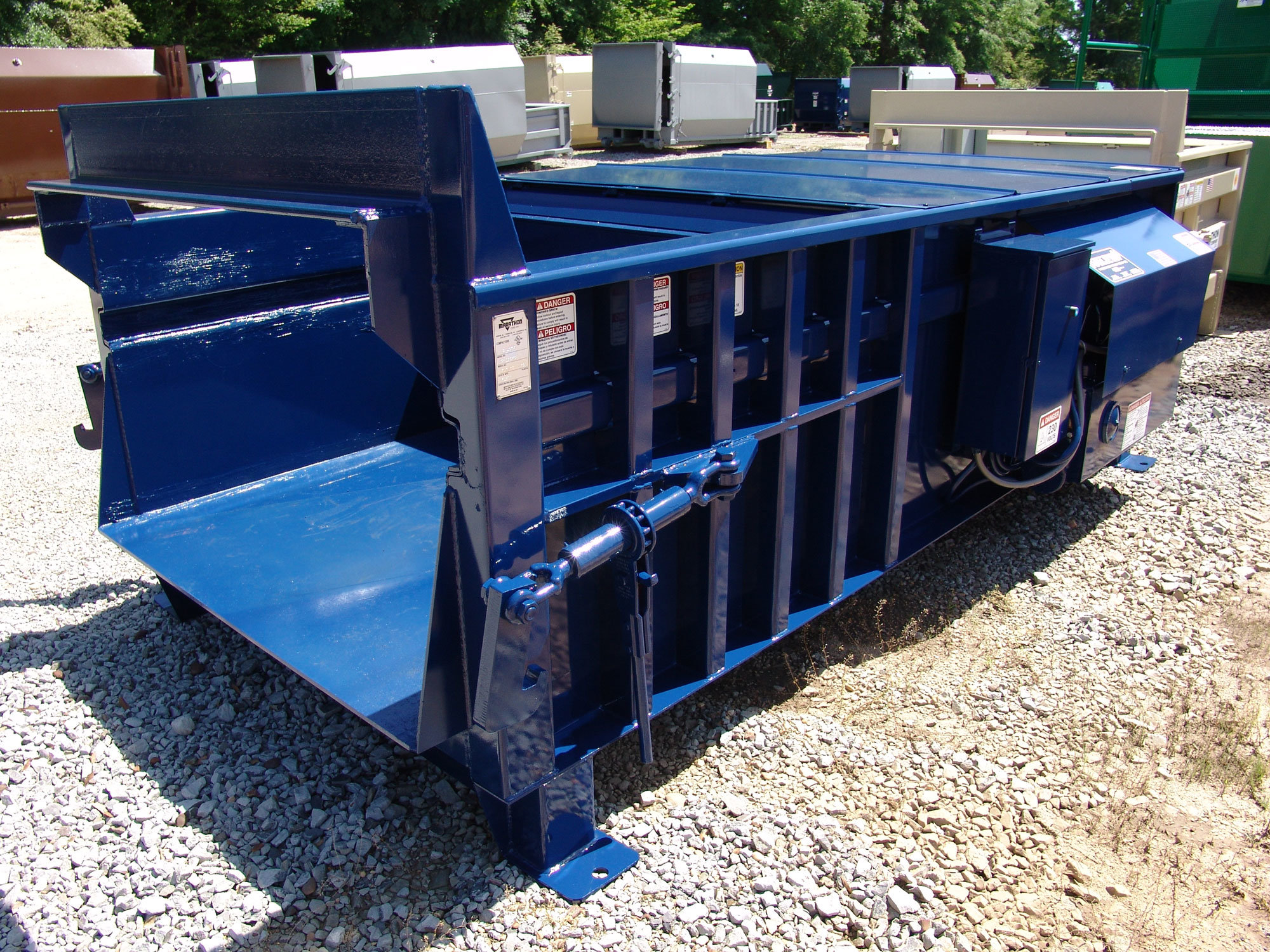A closer look at Commercial trash compaction equipment for optimized waste solutions
Wiki Article
The Duty of Waste Equipment in Supporting Sustainable Waste Disposal Practices
Waste Equipment offers a basic function beforehand lasting waste disposal methods. It includes a variety of devices designed to improve the performance of waste processing, collection, and partition. By utilizing Equipment such as compactors, shredders, and recycling bins, communities can considerably minimize their reliance on garbage dumps. However, the effect of these devices prolongs past performance. Recognizing their wider effects exposes understandings right into exactly how they form ecological obligation and neighborhood interaction. What exists in advance in this developing landscape?Recognizing Waste Equipment and Its Importance
Waste Equipment plays an important duty in reliable waste management systems. It encompasses a range of devices and machinery created to handle, process, and take care of waste materials effectively. Comprehending waste Equipment is very important for organizations, municipalities, and organizations aiming to carry out lasting garbage disposal techniques - Commercial garbage compaction equipment. Correctly working waste Equipment not only streamlines the collection and transport of waste yet likewise minimizes ecological impact by making certain that waste is handled sensiblyThe relevance of waste Equipment encompasses boosting recycling efforts, reducing garbage dump usage, and promoting resource recuperation. Equipment such as shredders, compactors, and balers assist in the handling of waste, making it much easier to divide recyclable materials from basic refuse. Additionally, developments in waste modern technology add to the growth of even more eco-friendly solutions, therefore strengthening the commitment to sustainability. On the whole, waste Equipment functions as a cornerstone for effective waste administration, fostering a cleaner and much healthier environment for future generations.
Kinds Of Waste Equipment for Effective Waste Monitoring
Effective waste monitoring depends on various kinds of Equipment made to deal with particular disposal requirements. Among these, compactors play an important function by reducing the quantity of waste, making transport much more efficient. Shredders are essential for breaking down big things, facilitating simpler handling and disposal. In addition, balers compress recyclable products into manageable bundles, maximizing storage space and transport.Containers and bins are essential for gathering waste at the source, ensuring correct partition and decreasing contamination. For harmful materials, specific Equipment, such as drum crushers and leak-proof containers, is essential to assure safety and security and compliance with laws.
Transport lorries equipped with hydraulic systems enhance the efficiency of waste collection and disposal procedures. Each kind of waste Equipment adds to a streamlined waste management system, advertising sustainability and reducing ecological influence with efficient disposal methods.
The Function of Reusing Containers in Sustainable Practices
Recycling containers play an important function in promoting lasting methods by assisting in efficient waste splitting up. By providing assigned containers for recyclable products, they motivate individuals to take on environment-friendly actions. This easy execution greatly contributes to reducing landfill waste and enhancing recycling rates.Reliable Waste Separation
Correct waste separation plays a critical function in promoting sustainable methods, and recycling bins act as a considerable device in this process. By plainly differentiating between recyclables, compostables, and basic waste, these bins help with efficient sorting, reducing contamination and maximizing recycling effectiveness. Their critical positioning in public and exclusive areas urges people to get involved in liable garbage disposal. The use of color-coded bins assists to simplify the separation procedure, making it user-friendly for users. This business strategy not just enhances recycling prices however additionally increases recognition about the relevance of waste monitoring. Essentially, recycling bins are fundamental components that sustain reliable waste separation, eventually adding to a more sustainable environment and decreasing the general stress on landfills.Urging Eco-Friendly Actions
Although individuals may be inclined to neglect their effect on the atmosphere, the presence of recycling bins substantially affects environmentally friendly behavior. These bins offer as aesthetic suggestions, encouraging people to separate recyclables from basic waste. Their critical placement in public areas advertises accessibility, making it simpler for individuals to adopt lasting techniques. Research studies indicate that when reusing bins are readily available, recycling prices raise significantly, showing a straight relationship in between framework and actions. Additionally, vivid signage on these containers enlightens individuals about what products can be reused, minimizing contamination rates. By promoting a society of recycling, these bins not just assist in correct waste monitoring yet also influence a cumulative duty toward environmental stewardship, ultimately adding to a much more sustainable future.Composting Equipments: Transforming Waste Into Resources
Composting systems work as a crucial tool in transforming organic waste right into beneficial resources, supplying many environmental advantages. Different types of composting Equipment provide to various requirements, making the process obtainable to both people and neighborhoods. Recognizing the composting procedure is essential for maximizing its performance and promoting sustainable waste monitoring techniques.Advantages of Composting Equipments
Numerous areas are significantly acknowledging the various benefits of composting systems, which change natural waste right into beneficial resources. These systems efficiently decrease garbage dump waste, thereby lowering greenhouse gas exhausts and conserving natural sources. By transforming food scraps, lawn waste, and other organic materials right into nutrient-rich compost, they enhance dirt health and fertility, advertising sustainable agriculture practices. Moreover, composting assists to maintain dampness in the soil, decreasing the demand for chemical fertilizers and watering. It cultivates biodiversity by giving a habitat for useful microbes and bugs. In addition, composting enlightens people about ecological stewardship, encouraging a culture of sustainability. Generally, composting systems play a crucial role in creating a circular economic situation, where waste is decreased, and resources are reused.Kinds Of Composting Equipment
A range of composting Equipment is readily available to help with the effective processing of organic waste right into beneficial compost. These systems range from basic backyard garden compost containers to sophisticated business composters. For home use, stemless glass and fixed containers are popular, permitting workable aeration and blending. Aerated fixed heaps use blowers to improve air flow, greatly quickening decay. Large-scale procedures might employ in-vessel composters, which manage temperature level and moisture for ideal composting conditions. Worm composters, or vermicomposting systems, harness the natural digestion procedures Commercial garbage compaction equipment of worms to break down organic issue. Additionally, shredders and chippers assist prepare products by minimizing dimension, promoting faster malfunction. Each kind of Equipment serves certain demands, enabling varied composting techniques that add to lasting waste administration.Composting Refine Explained
The composting process changes organic waste into nutrient-rich sources via a series of organic and chemical reactions. At first, microbes such as fungis and microorganisms break down natural products, including food scraps and backyard waste. This decomposition creates warmth, assisting in additional microbial activity and increasing the breakdown process. As the garden compost develops, the temperature reduces, permitting beneficial organisms to flourish. The existence of oxygen is important, promoting aerobic problems that improve microbial effectiveness. Throughout this process, carbon-to-nitrogen ratios need to be maintained to maximize decay. The end outcome is humus, a dark, crumbly material abundant in nutrients, which can be used to enhance soil, support plant development, and add to lasting agricultural methods.Ingenious Technologies in Waste Collection and Disposal
As cities face raising waste volumes and ecological concerns, innovative technologies in waste collection and disposal arise as important remedies. Smart waste containers outfitted with sensing units track fill levels, maximizing collection courses and decreasing fuel consumption. These containers can also interact with waste administration systems, decreasing and assisting in timely pickups overflow issues. Additionally, self-governing cars, including drones and robotic systems, are being deployed to enhance functional effectiveness in waste collection.Improvements in sorting innovations, such as synthetic intelligence and machine understanding, make it possible for more efficient reusing processes by rapidly identifying and separating products. Waste-to-energy innovations transform organic waste right into eco-friendly power, lowering garbage dump reliance and contributing to energy sustainability. These innovations not just enhance waste monitoring practices but also advertise a round economic situation, thus fostering a sustainable strategy to waste disposal. Inevitably, the integration of these modern technologies plays an essential role in addressing metropolitan waste challenges and enhancing ecological stewardship.
Area Engagement Through Waste Equipment
While reliable waste administration counts heavily on sophisticated innovations, community involvement with waste Equipment plays an essential role in promoting sustainable practices (Commercial garbage compaction equipment). Waste Equipment, such as reusing bins and composting stations, offers not only as functional devices however also as stimulants for area recognition and engagement. By putting these resources in available locations, districts motivate individuals to take an energetic role in waste decrease and recycling effortsEducational campaigns accompanying waste Equipment installments can additionally enhance neighborhood participation, assisting residents on proper disposal approaches and the benefits of lasting techniques. Furthermore, neighborhood occasions that utilize waste Equipment, such as clean-up drives and recycling difficulties, inspire cumulative action and build a feeling of duty among community members.

The Future of Waste Administration and Sustainable Solutions
Technologies in technology and changes in societal perspectives are shaping the future of waste management and sustainable remedies. Smart waste monitoring systems, using IoT devices, are enabling real-time surveillance of waste degrees, optimizing collection paths, and minimizing carbon impacts. These improvements not only improve performance however also promote reusing and composting initiatives by providing data-driven understandings.
In addition, the rise of circular economic climate techniques encourages business to reassess item design, concentrating on reusability and recyclability. This change fosters a culture of sustainability, where consumers are progressively requiring green items.
Neighborhood participation in waste management is coming to be increasingly essential, with instructional programs empowering people to take duty for their waste. As governments worldwide execute more stringent guidelines on garbage disposal, communities and companies are prompted to adopt sustainable techniques. With each other, these aspects lead the way for a future where waste is decreased, and sources are preserved, ensuring a healthier earth.
Frequently Asked Concerns

How Can Organizations Profit Financially From Buying Waste Equipment?
Buying waste Equipment can lead to substantial financial advantages for companies. By improving effectiveness, decreasing disposal prices, and improving reusing abilities, companies can reduce operational costs and potentially produce income via recouped products.What Laws Regulate making use of Waste Equipment in Different Areas?
Various policies govern waste Equipment usage, differing by region. These consist of ecological standards, safety procedures, and operational standards, targeted at making certain conformity, advertising public health, and lessening environmental influence connected with waste monitoring practices.Just how Do I Choose the Right Waste Equipment for My Requirements?
Picking the proper waste Equipment requires examining particular waste kinds, volume, and disposal approaches. Investigating offered choices, speaking with professionals, and considering regulatory compliance will assist in making an informed choice customized to specific needs.What Are the Ecological Influences of Ineffective Waste Equipment?
Inefficient waste Equipment can bring about increased emissions, higher energy consumption, and higher garbage dump overflow. It often results in incorrect waste partition, worsening air pollution and adversely influencing ecosystems, which ultimately hinders sustainable waste management efforts.How Can Waste Equipment Be Maintained for Optimum Performance?
Waste Equipment can be maintained for peak efficiency with normal examinations, timely repairs, appropriate cleaning, and adherence to supplier guidelines. This guarantees effectiveness, extends Equipment life-span, and minimizes ecological influence during waste monitoring procedures.Waste Equipment plays a vital function in effective waste management systems. Understanding waste Equipment is important for services, organizations, and communities intending to execute lasting waste disposal methods. While effective waste monitoring depends greatly on sophisticated technologies, community involvement through waste Equipment plays an essential duty in fostering lasting practices. Area involvement in waste monitoring is becoming significantly vital, with academic programs empowering individuals to take duty for their waste. Choosing the ideal waste Equipment requires evaluating certain waste kinds, volume, and disposal techniques.
Report this wiki page